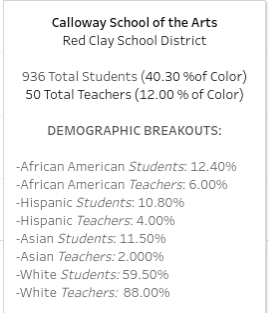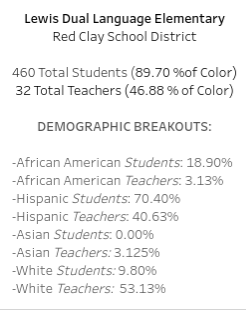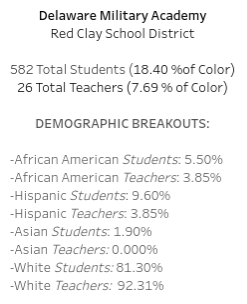It’s no secret that Delaware schools have a a race problem.
Once home to one of the most desegregated school systems in the nation, it’s now a textbook example of resegregation, with one of the highest rates of private school enrollment and a charter school system that has (illegally, according to an ACLU lawsuit) been used to create “identifiably white” schools (both charter and magnet) that keep out low-income children and/or those with disabilities.
This systemic abuse has led to some truly positive programs and charters aimed at low-income children of color, including One Village Alliance, Summer Collab, Freire Charter and TeenSHARP. But the system is still broken for most Black and Latino kids in Delaware.
DelawareCan has created an interactive map that shows the racial diversity of traditional public, magnet and charter schools in the state, using state Department of Education data to measure both the racial breakdown of the student body and the teachers, as well as administration.
See the dataThe results show that, while several traditional high schools in Northern Delaware have diverse “minority majority” student populations split fairly evenly between Black, Latino and white students, very few have even 25 percent teachers of color — even in schools that are predominantly Black and/or Latino. These numbers support Represented, a student-led partnership between DelawareCan and the Youth Advocacy Council that seeks to increase the number of teachers of color in Delaware schools.
When exploring the data, there are a couple of baseline numbers to keep in mind: First, 50 percent of white students in Delaware do not attend public schools, according to a 2014 UCLA study on Delaware resegregation.
In Delaware, the Black population is 22 percent — and it’s 58 percent in Wilmington. Since only two public high schools are located in Wilmington proper (Charter School of Wilmington and Cab Calloway, both predominantly white schools that live in the old Wilmington High building), many city students still take the bus to the suburbs, which is why schools like McKean, Dickinson and A.I. duPont are racially mixed — but no longer predominantly white, despite being in majority white areas.

Data for the Calloway School. (Screenshot)
Of the predominantly Black and/or Latino schools in the Red Clay School District, only three (Lewis Elementary, a dual-language school that teaches Spanish and English together, and predominantly Black elementary schools Shortlidge and Warner) have more than 22 percent teachers of color. The next highest, McKean, is the only high school in the district with more than 20 percent teachers of color. The biggest discrepancy is Highlands Elementary, located in the tony, mostly white Rockford Park neighborhood with a student body that is 94 percent Black and Latino and a teacher demographic that is 89 percent white.
“It’s really important that students have people who reflect back to them their language, their culture, their ethnicity, their religion,” Harvard education researcher Sarah Leibel has said. “It doesn’t mean all the people in their lives have to do that mirroring, but they should have some. And we know that in the teaching profession, there really are not enough mirrors.”

Data for Lewis Dual Language. (Screenshot)
The whitest schools? Overall, Lord Balt Elementary (Indian River), Delaware Military Academy (Red Clay) and Southern Delaware School of the Arts (Indian River). In northern Delaware, where the general population is more racially diverse, it’s DMA, Brandywine Springs, Heritage Elementary and First State Montessori.

Data for the Delaware Military Academy. (Screenshot)
Join our growing Slack community
Join 5,000 tech professionals and entrepreneurs in our community Slack today!
Donate to the Journalism Fund
Your support powers our independent journalism. Unlike most business-media outlets, we don’t have a paywall. Instead, we count on your personal and organizational contributions.

Traditional PPE isn’t made for everyone. Here’s how one startup is fixing it.

Comcast introduces ultra-low lag Xfinity internet that boosts experiences with Meta, NVIDIA and Valve

This Canadian startup with a network of 100,000 is helping international college students find their careers


